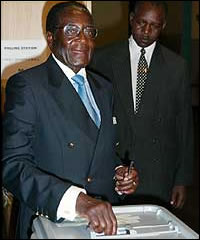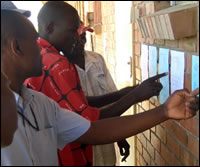Zimbabwe Elections : Out of the Frying Pan into the Fire ?

 |
| Julius & Silvern Musara at a polling station at 6AM |
The MDC alleged that the delay was meant to give the state machinery time to fix the vote in Mugabe’s favour. For now, that allegation remains the self-serving charge of the MDC, but it will gain believability with every additional hour of delay.
The taint of a suspected stolen win will not bother those who support Mugabe on the basis of what he symbolises, rather than on his skills at administering a country. For Mugabe's supporters, his railing against a vast imperialistic conspiracy against Zimbabwe’s “sovereignty” rings true and justifies Mugabe’s autocratic rule. It also explains and excuses his failure to stem a very steep decline in the country’s economy.
Zimbabwe’s once widely admired commercial farming sector lies in ruins, victim to Mugabe’s naïve hope that he could engineer an overnight change with little thought to what was required to put in place a new model. Mugabe is widely accused of only paying attention to land reform two decades after independence in an effort to save his party in the parliamentary election of 2000, prior to which a constitutional referendum had given the first clear signs of how disaffected Zimbabweans had become with his rule.
 |
| Mugabe casting his vote in a past election |
Mugabe tapped into a genuinely-felt desire amongst black Zimbabweans’ for political independence and stronger stake in the economy than had been the case. Unfortunately, attempts to do so have often been simplistic and focused on redistribution instead of the more long term, harder job of creating conditions for the participation of more Zimbabweans in the creation of new wealth.
Mugabe created unrealistic expectations about the ease, time scale and level of “economic empowerment” that could be achieved by simple expropriation and change of ownership by decree. The crisis of expectations was compounded by worsening political and economic conditions that actively worked against his own claimed empowerment efforts.
Mugabe also became arrogant and increasingly difficult for many Zimbabweans to relate to as a leader, even as he elicited wild cheers from Africans afar who did not have to actually live under his rule. A shameless cronyism became a hallmark of his administration. Critical newspapers were shut down, the democratic and intellectual space vastly restricted. Land was parcelled out willy-nilly without crucial kinds of support. The lack of security of tenure, rising inflation and many other factors worked against many of the measures meant to patch up the land reform process that went increasingly off course each year since 2000.
 |
| Voters checking results |
The bloody war of liberation is deeply ingrained in Zimbabwe’s consciousness that Mugabe’s rallying cries of sovereignty, African empowerment and suspicions of a West that opposed that liberation war cannot just be dismissed as mere politicking. Mugabe exploited these real undercurrents as an excuse for his failures and errors of commission.
Mugabe’s complex legacy transcends whether he is declared winner or accepts defeat. If he is booted out, his economic failures and repression will be the main focus of the immediate analysis of his tenure. His basic message about what “independence” and “majority rule” really mean will however remain and influence how his successors are judged.
Mugabe has stayed way beyond his ability to successfully grapple with the many critical issues Zimbabwe faces. It is a shame that he chose to stand in the election at all. He has worked himself into a diplomatic and economic corner in which he cannot improve the parlous situation of even his most fervent ordinary supporters. Arguably, another term for him guarantees a lot more suffering and decline for Zimbabwe.
None of the foregoing is to suggest that I am eagerly looking forward to an MDC government under a Morgan Tsvangirai presidency. For me, this election is more about the hope of moving beyond a 30 year Mugabe era that not only no longer offers the country hope, but guarantees more oppression, fear, increased economic hardship and decline as well as diplomatic isolation.
Moving beyond the angry, defensive, paranoid, corrupt and incompetently ruled present would give Zimbabwe at least the chance of recovery; a badly needed fresh start that is not possible with another term for Mugabe. But I have grave doubts that Tsvangirai and the MDC offer the best prospects of the kind of fresh start I would like Zimbabwe to have. The boorish way MDC conducts its affairs suggests that its political culture has more in common with ZANU-PF. Long before they experienced the power of governorship, many of the party’s prominent officials display a sense of “entitlement” to the spoils of political office. I expect that many appointments in an MDC government would be made on the basis of anti-Mugabe “struggle history” more than any other qualification, just as anti-Rhodesia struggle history in Mugabe’s government became a qualification for high office as well as an excuse for everything including murder.
I am uncomfortable with the MDC’s old-style client-patron relationship with the West. I fear going from the one extreme of Mugabe’s self-serving, demonising and blaming of the West for all his failures, to another extreme of a Tsvangirai presidency in which Zimbabwe is slavishly beholden to and controlled by that West. I do not want foreign money to flow in the old, dysfunctional, demeaning donor-receipient relationship that has served Africa so poorly over the decades of the post-colonial era.
What to do about reviving commercial agriculture will be a critical issue, and Tsvangirai would have to deal with this issue under the cloud of being suspected by some to be hostage to white farming interests. Yet arguably, the model of huge farming estates run by white “bwanas” with hundreds of native workers has run its course. No matter how “successful ” it was in strict crop yield and foreign currency-earning terms, it is an incendiary model given southern Africa’s still raw racial wounds. It is time to think hard about a new commercial farming model that meets the country’s economic needs while paying attention to many other societal imperatives.
I hope for Mugabe’s defeat, but would not initially be jumping up and down with any great excitement at the prospect of a Tsvangirai presidency. Even if this is the election that deservedly dispatches Mugabe into retirement, it would just be the first of many steps of building a new Zimbabwe.
